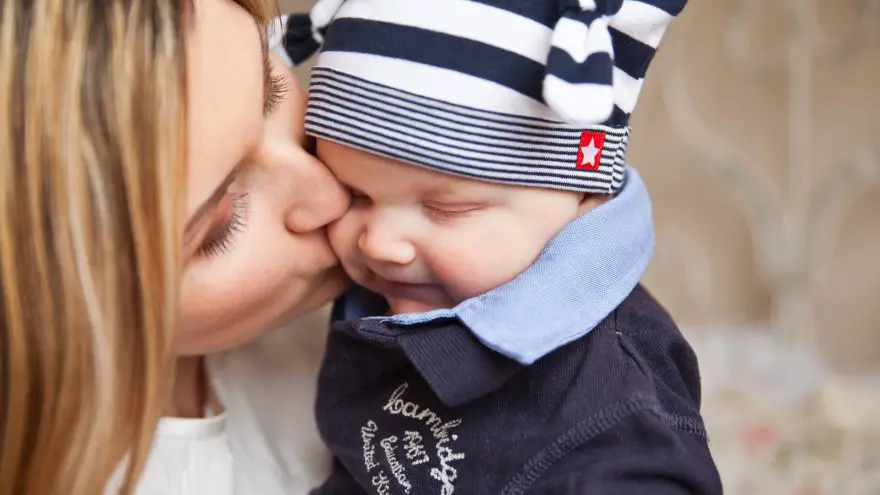What to Do When your Kid Doesnt want you to Leave

There’s nothing like the bond between a parent and a child. Usually, when we talk about bonds between parents and their kids, we think of adolescents or even children who have reached adulthood. But we shouldn’t forget (though it seems fairly obvious) that a definite bond exists between babies and parents, and toddlers and parents.
The bond between parents and actual, young children—while still very special—is a little different than the bond that exists between parents and adolescents. In the case of younger children (specifically babies and toddlers) much of the bond is one that is essentially survival based in both a physical and emotional sense (for the child).
In certain instances, even though you want your child to have a secure bond with you, the bond can actually be a little too much to the point where the nature of the bond could even be seen as a slight detriment (only at times).
Saying that a bond can be detrimental seems pretty odd. So, in this case, it isn’t really the bond itself that’s detrimental, but it’s the way the child views the bond, and the ways in which the child reacts or behaves when the parent is absent at any time during the day or if the bond seems disrupted in some sort of way.
Here, we’re talking about an instance in which the child almost feels as if the entire bond is broken just because a parent needs to leave the house in order to run errands, go to work, or the inevitable point when a child needs to be dropped off at school.
Put quite simply, what we’re talking about here is separation anxiety experienced by children. Now again, a bond definitely isn’t being broken when a parent has to leave a child for a bit, but a child actually might feel that way when the child is left in the absence of a parent. In these cases, it’s very common that a child might feel abandoned, and abandonment can certainly cause much distress, panic, confusion, or anxiety.
Young children are very dependent on their parents simply because many children haven’t engaged in much socialization outside of interactions with their parents, and a child’s life is actually dependent on nourishment provided by parents.
For a while—especially in the early stages of life—the only people that a child spends time with is their parents. In many ways, children don’t know what life is like without the presence of a parent (this is certainly true for babies, or children who have just begun to enter toddlerhood).
Now, just because a child struggles with the absence of a parent, even if it’s just for a few hours, that doesn’t mean that something is wrong with the child. For many children, separation anxiety is a very normal occurrence (though the degrees of anxiety can sometimes be experienced to an extreme degree, and that’s when it becomes detrimental to the child’s psyche).
So, do you think that your child may be suffering from separation anxiety? If so, is it tearing you apart, breaking your heart, and are you struggling to find ways to alleviate the anxiety your child experiences? Well, if you answered yes to any of the above questions, it’s important that you understand that you aren’t alone and that there are steps to be taken to tackle the issue.
How to Know if your Child has Separation Anxiety
Figuring out whether or not your child suffers from separation anxiety really isn’t that hard to do. If you go off to work and have to leave your child behind (hopefully with a caregiver) and she consistently throws temper tantrums, or if she appears to be terrified to go to school when you drop her off, it’s pretty likely that your kid is dealing with separation anxiety.
Consistency is the key word here. It’s totally naturally that at first a child would be a little nervous in the absence of a parent. Again, for much of a child’s early life the presence of parents is practically all the child knows.
Many children get the jitters when dropped off at a school (especially for the first time), and it makes sense that a child might be a bit confused in your absence. So, if your kid seems a little tense or distraught in the first few instances of time apart between the two of you, there really isn’t much to worry about. Sure, it might make you a little sad (no one wants to see their child in a state of emotional duress), but really it’s no big deal.
If it’s every time that your child has a meltdown, experiences fear in every instance that you leave, or absolutely refuses to go to school or demands that you stay with her—then that’s certainly cause for concern.
When you watch your child spiral into such a state of fear, you probably feel as if the situation is totally out of your hands and that there’s nothing you can do. That’s simply not the truth. While dealing with separation anxiety is certainly taxing and distressing, you in no way have to feel completely helpless or hopeless.
What your Child feels During a State of Separation Anxiety
At first you might think to yourself, “What’s the big deal? Why can’t my kid just accept that I’m only going to be gone for a few hours?” Really, it shouldn’t a be a big deal, but for children who experience separation anxiety, there’s actually a whirlwind of emotions that occur.
For one, your child may very well feel as if she’s being abandoned, and abandonment is a tough pill to swallow no matter how old you are. Often, when we feel abandoned we feel unwanted or unloved. Again, that’s a crushing feeling for an adult. But, when you’re a child, feeling unloved is just flat out confusing and scary—especially since it seems as if it comes out of nowhere.
Your child may also feel as if something bad is going to happen to her in your absence. Parents make children feel safe and at ease, and if that comfort disappears, children could very well feel as if they are no longer safe (from whatever it is that they perceive to be a danger).
No one wants to feel such confusion, fear, or despair, but it’s definitely tough to watch a child (let alone your child) go through feelings such as these.
What to do if you’re child experiences separation anxiety
There are several methods and approaches you can take in order to combat the perils of separation anxiety. It typically isn’t an arduous or exhausting experience (it might be a bit at first), but it’s definitely easier than you might initially imagine.
Don’t Sneak Off
If you feel like you can no longer handle the stress of your child’s separation anxiety, your first instinct might just to be to sneak off to work or to run your errands so that your child doesn’t have the chance to blow up at you. What you have to remember here, though, is that this only seemingly helps you (and in all honesty it doesn’t help in the slightest).
Sneaking off is only temporary relief for yourself (unless your day is filled with guilt if you feel you’ve abandoned your kid). If you sneak off, you’re only avoiding the issue, and you’re only doing so for a brief period of time.
For one, if you run out the door while your child is unaware, it isn’t going to make your child feel any better. She’ll have no idea where you went, and a strong sense of confusion is bound to set in.
Sneaking off really isn’t a solution at all, it really just exacerbates the issue. In fact, you’re pretty much showing (most likely inadvertently) that you don’t care about her feelings—that you only care about yourself. Sure, avoidance is going to make things a bit easier (again, only temporarily), but sneaking off isn’t going to make your child feel wanted if you let her think that her needs aren’t important.
Even if your initial approach is to sneak off, it’s not as if you should feel that you’re a bad parent or that you’ve done something wrong. A desire to avoid conflict is totally natural. So, you don’t have to wonder whether or not you actually care about your child in the instance that you sneak out the door.
Make the Goodbye Quick
While you don’t exactly want your child to feel as if her problems aren’t worth your time, you have to make sure she understands that the two of you can’t spend all morning dealing with your child’s separation anxiety. This isn’t because you have better things to do (don’t tell your kid that), but your child should know that your absence will only be brief, and a brief exit can very well make her comprehend that.
If you delay leaving, your child’s behavior is only going to be reinforced, and she won’t be able to accept the idea that you’re not always going to be around at every moment of the day.
If you say to your kid, “I know you’re upset, but I promise I won’t be gone long,” she’ll have a strong grasp on the fact that the absence is only temporary. Acknowledging your kid’s feelings quickly (that doesn’t mean brushing them off), and then making a quick exit will show your kid that you understand her pain but that it isn’t going to last forever. She may be a bit upset at first, but she has to get used to the fact that you’re going to be gone at certain times and leaving quickly is sort of like immediate exposure.
Just think of it as ripping of a bandage in one go. Slowly trying to ease the pain isn’t always the best way to do it. Sometimes you just need to get it over with.
Now, one thing you need to make sure of in this case, is that you can’t leave without showing any sort of affection. A quick (but warming) hug is always a good idea, or showering your child with lots of love and kisses works wonders as well.
Remember, it’s your kid’s feeling of abandonment that you want to avoid, so just leaving all of a sudden without any love shown at all is only going to increase that feeling of abandonment.
Create a Special Ritual
This is something that should really be done in tandem with leaving speedily. You have to do things (like show her love) that she’ll associate (more or less positively) with your need to go out for a bit; and they need to be done in every instance that you leave.
One thing to try in addition to a healthy dose of love, is a special handshake. Your child will understand that you’ve got to be on your way, but the special handshake will sort of create another level to the bond between the two of you. A particular handshake is something that’s unique to your relationship, and while it may be something that’s only done when you’re on your way out the door, it’s still going to make your kid feel special.
But remember, the ritual is all about association. You can’t just show love every few days or do the handshake from time to time. Associations can only be formed by constancy.
You Have to Stay calm Yourself
There’s so many instances where your child’s level of stress is actually dependent on your own level of stress. If your child notices that you’re freaking out when she throws a temper tantrum, it typically isn’t going to calm her down. She’ll see that you’re upset, and that’s actually going to make her believe that there’s actually something to be upset about.
Of course, it’s imperative that you show empathy, but shedding tears of your own and panicking isn’t going to make your child feel better.
Spend time Together Before you Leave
Yes, there are many times when you’re running late and you have to get out the door as quickly as possible. And you may not think about it, but sometimes this actually affects your child.
If you don’t make any effort to interact with your child before you leave the house, she might not feel as if you care for her at all (although you probably care for her deeply).
Since we’re talking about separation anxiety here, it may seem a bit odd that you would spend time with your kid only to have to cut it off and be on your way. But spending time with your kid at least shows that you care—it shows that you don’t actually want to leave her behind, but sometimes you just simply have to do so.
Some fun Games to Get her Used to Absence
One way to avoid the issue of separation anxiety altogether is to play games in which you “disappear” for a bit—something along the lines of peekaboo, or simply hiding behind furniture from time to time and asking her to come find you.
These are games that will most likely have to be played before your absence will be more common, but she’ll at least understand that there are times when she can’t always see you.

In many cases, separation anxiety is simply caused by a sudden shock in your disappearance, and if your kid understands that you’ll sometimes be out of sight, she might not be as distraught when you actually have to leave her for a certain portion of the day.
Separation Anxiety Disorder
If there seems to be no methods that work—that everything you’ve tried simply can’t alleviate the anxiety—then it’s possible your kid has separation anxiety disorder. If this is the case, you shouldn’t fret.
You can always try family counseling, talk therapy, play therapy, and in some instances, medication. But remember, this should only be done if the anxiety persists for an elongated period of time. Separation anxiety isn’t totally uncommon, but if the length of time the anxiety is experienced seems unreasonable or unnatural, then you should probably seek the help of a professional.
So, as you can see, separation anxiety can be taxing and, in many cases, even a bit depressing. But, it’s not as if you’re raising a trouble child just because she gets nervous or sad when you leave. This might sound strange, but maybe you could take it as a form of flattery. There are definitely instances in which parents experience no reciprocal love from their children, so at least you know that your child cares about you when you have to confront the issue of separation anxiety.
Just know that separation anxiety doesn’t automatically translate to disfunction, and that there are ways to approach the situation without a world of drama.








